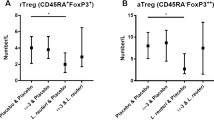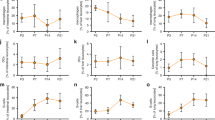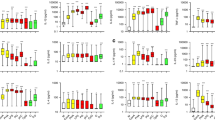Abstract
Objective: To determine effects of vitamin A, zinc and iron deficiency in Indonesian infants on the ability to produce immunoregulatory cytokines.
Design, setting and subjects: Immunological asssessment was done in 59 infants participating in a cross-sectional nutritional survey in rural West Java, Indonesia. Production of T-helper cell type-1 (Th1, cell-mediated) cytokines interferon-γ (IFN-γ), interleukin-12 (IL-12), interleukin-18 (IL-18) and T-helper cell type-2 (Th2, humoral) cytokine interleukin-6 (IL-6) were measured after stimulation with lipopolysaccharide and phytohemagglutinin in an ex vivo whole blood culture system. Circulating neopterin concentrations were determined as an indicator of in vivo macrophage activity.
Results: Of the infants, 48% were vitamin A deficient, 44% were anemic (with 17% having iron deficiency anemia), and 17% were zinc deficient. Vitamin-A deficient infants had significantly reduced ex vivo production of IFN-γ, but also significantly higher circulating neopterin concentrations. Production of IFN-γ and IL-12 were strongly correlated, IFN-γ and IL-18 production were not. Zinc deficiency was accompanied by significantly reduced white blood cell counts and reduced ex vivo production of IL-6. Iron status was not related to cytokine production.
Conclusions: This study shows that in vitamin A deficiency there is Th1 dominance in a steady state, combined however with impairment of the Th1 response after stimulation, whereas in zinc deficiency, there is a decreased Th2 response. Overall, vitamin A deficiency and zinc deficiency have marked albeit different effects on the immunocompetence of infants, affecting both cell-mediated and humoral components of the immune system.
Sponsorship: Netherlands Foundation for the Advancement of Tropical Research (WOTRO), and Ter Meulen Fund (Royal Netherlands Academy of Arts and Sciences).
This is a preview of subscription content, access via your institution
Access options
Subscribe to this journal
Receive 12 print issues and online access
$259.00 per year
only $21.58 per issue
Buy this article
- Purchase on Springer Link
- Instant access to full article PDF
Prices may be subject to local taxes which are calculated during checkout


Similar content being viewed by others
References
Bates CJ (1995): Vitamin A. Lancet 345, 31–35.
Beaton GH, Martorell R, L’Abbe KA, Edmonston B, McCabe GP, Ross AC & Harvey B (1992): Effectiveness of vitamin A supplementation in the control of young child morbidity and mortality in developing countries. Final report to CIDA, University of Toronto, Canada.
Beck FW, Prasad AS, Kaplan J, Fitzgerald JT & Brewer GJ (1997): Changes in cytokine production and T cell subpopulations in experimentally induced zinc-deficient humans. Am. J. Physiol. 272, E1002–E1007.
Bhutta ZA, Bird SM, Black RE, Brown KH, Meeks Gardner J, Hidayat A, Khatun F, Martorell R, Ninh NX, Penny ME, Rosado JL, Roy SK, Ruel M, Sazawal S & Shankar AH (2000): Therapeutic effects of oral zinc in acute and persistent diarrhea in children in developing countries: pooled analysis of randomized controlled trials. Am. J. Clin. Nutr. 72, 1516–1522.
Bowman TA, Goonewardene IM, Pasatiempo AM, Ross AC & Taylor CE (1990): Vitamin A deficiency decreases natural killer cell activity and interferon production in rats. J. Nutr. 120, 1264–1273.
Brown KH (1998): Effect of infections on plasma zinc concentration and implications for zinc status assessment in low-income countries. Am. J. Clin. Nutr. 68, 425S–429S.
Cantorna MT, Nashold FE & Hayes CE (1994): In vitamin A deficiency multiple mechanisms establish a regulatory T helper cell imbalance with excess Th1 and insufficient Th2 function. J. Immunol. 152, 1515–1522.
Dijkhuizen MA, Wieringa FT, West CE, Muherdiyantiningsih & Muhilal (2001): Concurrent micronutrient deficiencies in lactating mothers and their infants in Indonesia. Am. J. Clin. Nutr. 73, 786–791.
Dijkhuizen MA, Wieringa FT, West CE & Van Wouwe JP (2003): The role of zinc as a nutrient and its significance for health. In Bioavailability of micronutrients and minor dietary compounds. Metabolic and technological aspects. Eds. Pilar Vaquero M, Garcia-Arias T, Carbajal A & Sanchez-Muniz FJ, Trivandrum (Kerala), India: Research Signpost,. Chapter 5, pp 55–68.
Driessen C, Hirv K, Kirchner H & Rink L (1995): Zinc regulates cytokine induction by superantigens and lipopolysaccharide. Immunology 84, 272–277.
FAO/WHO (1992): International conference on nutrition. World declaration and plan of action. FAO: Rome.
Gibson RS (1990): Principles of Nutritional Assessment. Oxford: Oxford University Press.
Hatakeyama D, Kozawa O, Otsuka T, Shibata T & Uematsu T (2002): Zinc suppresses IL-6 synthesis by prostaglandin F2alpha in osteoblasts:inhibition of phospholipase C and phospholipase D. J. Cell Biochem. 85, 621–628.
Huber C, Batchelor JR, Fuchs D, Hausen A, Lang A, Niederwieser D, Reibnegger G, Swetly P, Troppmair J & Wachter H (1984): Immune response-associated production of neopterin. Release from macrophages primarily under control of interferon-gamma. J. Exp. Med. 160, 310–316.
Jansen PM, van der Pouw Kraan TC, de Jong IW, van Mierlo G, Wijdenes J, Chang AA, Aarden LA, Taylor FBJ & Hack CE (1996): Release of interleukin-12 in experimental Escherichia coli septic shock in baboons: relation to plasma levels of interleukin- 10 and interferon-gamma. Blood 87, 5144–5151.
Jason J, Archibald LK, Nwanyanwu OC, Sowell AL, Buchanan I, Larned J, Bell M, Kazembe PN, Dobbie H & Jarvis WR (2002): Vitamin A levels and immunity in humans. Clin. Diagn. Lab. Immunol. 9, 616–621.
Lowe NM, Shames DM, Woodhouse LR, Matel JS, Roehl R, Saccomani MP, Toffolo G, Cobelli C & King JC (2001): A compartmental model of zinc metabolism in healthy women using oral and intervenous stable isotope tracers. Am. J. Clin. Nutr. 73, 356–358.
Okamura H, Kashiwamura S, Tsutsui H, Yoshimoto T & Nakanishi K (1998): Regulation of interferon-gamma production by IL-12 and IL-18. Curr. Opin. Immunol 10, 259–264.
Oppenheimer SJ (2001): Iron and its relation to immunity and infectious disease. J. Nutr. 131, 616S–635S.
Ross AC & Stephensen CB (1996): Vitamin A and retinoids in antiviral responses. FASEB. J. 10, 979–985.
Semba RD (1994): Vitamin A, immunity, and infection. Clin. Infect. Dis. 19, 489–499.
Shankar AH & Prasad AS (1998): Zinc and immune function: the biological basis of altered resistance to infection. Am. J. Clin. Nutr. 68, 447(S)–463(S).
van Crevel R, van der Ven J, Netea MG, de Lange W, Kullberg BJ & Van der Meer JWM (1999): Disease-specific ex vivo stimulation of whole blood for cytokine production: applications in the study of tuberculosis. J. Immunol. Meth. 222, 145–153.
Wiedermann U, Hanson LA, Kahu H & Dahlgren UI (1993): Aberrant T-cell function in vitro and impaired T-cell dependent antibody response in vivo in vitamin A-deficient rats. Immunology 80, 581–586.
Wieringa FT, Dijkhuizen MA, West CE, Northrop-Clewes CA & Muhilal (2002): Estimation of the effect of the acute phase response on indicators of micronutrient status in Indonesian infants. J. Nutr. 132, 3061–3066.
Acknowledgements
We would like to thank the mothers and the infants who participated in this study, and we are grateful for the enthusiastic help we received from Dr Hendra and his staff and from all the health volunteers from Situ Udik and Situ Ilir. Furthermore, we like to thank all the members of our field team, and the staff from the laboratories in Bogor, Nijmegen and Wageningen, for their untiring efforts and warm cooperation. Especially, we would like to thank Dr R Hermsen for the analysis of IL-12p70.
Author information
Authors and Affiliations
Contributions
Guarantor: JWM vd Meer.
Contributors: FTW and MAD were involved in the design, implementation, analysis of the study, and drafting of the manuscript. CEW as involved with the design of the study and drafting of the manuscript, JvdV-J was involved with the design and laboratory analysis of the study, Muhilal was involved in the design and implementation of the study, and JWM vd M was involved in design and analysis of the study. All authors contributed to the final version of the manuscript.
Corresponding author
Rights and permissions
About this article
Cite this article
Wieringa, F., Dijkhuizen, M., West, C. et al. Reduced production of immunoregulatory cytokines in vitamin A- and zinc-deficient Indonesian infants. Eur J Clin Nutr 58, 1498–1504 (2004). https://doi.org/10.1038/sj.ejcn.1601998
Received:
Revised:
Accepted:
Published:
Issue Date:
DOI: https://doi.org/10.1038/sj.ejcn.1601998
Keywords
This article is cited by
-
Oral vitamin A supplementation of porcine epidemic diarrhea virus infected gilts enhances IgA and lactogenic immune protection of nursing piglets
Veterinary Research (2019)
-
Maternal zinc supplementation improves hepatitis B antibody responses in infants but decreases plasma zinc level
European Journal of Nutrition (2016)
-
In Vitro Effect of Human Serum and Fetal Calf Serum on CD4+ T Cells Proliferation in Response to Myelin Oligodendrocyte Glycoprotein (MOG) in Correlation with RBP/TTR Ratio in Multiple Sclerotic Patients
Journal of Molecular Neuroscience (2013)
-
Alterations in early cytokine-mediated immune responses to Plasmodium falciparum infection in Tanzanian children with mineral element deficiencies: a cross-sectional survey
Malaria Journal (2010)
-
Maternal micronutrient supplementation with zinc and β-carotene affects morbidity and immune function of infants during the first 6 months of life
European Journal of Clinical Nutrition (2010)



